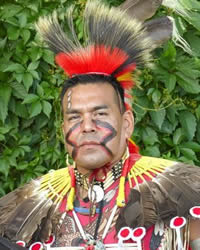The Assiniboin (often known also as Assiniboine, Nakota, or Nakoda) are a Siouan-speaking people historically of the Northern Plains, now found in parts of Montana and North Dakota in the U.S. Today, more live in Canada than the United States.
Their native tongue is Assiniboine, a dialect of the Dakotan branch of the Siouan family. Over time, fluent speakers have declined, and today many Assiniboin speak primarily English, with only a minority (especially elders) retaining competence in the native language.
According to oral tradition and historical reconstructions, the Assiniboin separated from the broader Sioux (Dakota / Nakota) group centuries ago, moving westward into the plains. They adapted a plains lifestyle of buffalo hunting, tipi lodging, and frequent mobility following herds. In historical times they forged alliances (for example with Cree groups) and navigated trade with European fur-traders, often acting as intermediaries.
Since the 19th century, disease, forced relocation, treaties, reservation life, assimilation policies, and cultural disruption have challenged the continuity of traditional Assiniboin lifeways. Many Assiniboin knowledge-keepers have worked to preserve their language and traditions through oral storytelling, ceremony, artwork, and cultural archives.
Today, many Assiniboin in Canada live on or near tribal reservations (for example Fort Peck, or in Montana) or in nearby towns. Their daily life often balances engagement with mainstream Canadian society (schools, jobs, commerce) with efforts to maintain or recover cultural identity.
Economic challenges are common. Some households face poverty, limited employment opportunities, and dependence on social services, especially in remote or reservation areas. (While exact figures vary, these challenges are widely reported among many indigenous communities in the region.)
Cultural revitalization efforts are a significant focus: community classes or gatherings for language, arts, traditional crafts, storytelling, and intergenerational transmission are valued. Elders, medicine people, and ceremonial leaders often play key roles as keepers of tradition and culture. There is also pressure from assimilation, youth drift, loss of land, and the influence of dominant culture on identity and values.
Social life may incorporate both traditional and Christian elements, resulting in a blend of cultural practices. Families may convene for powwows, community events, or cultural ceremonies, and often maintain strong kinship ties, community identity, and pride in heritage.
Access to health care, addiction support, mental health resources, and culturally appropriate educational opportunities are often limited or unevenly available.
Traditional Assiniboin spirituality was deeply woven into everyday life. Each major life event—birth, death, hunting, warfare, moving camp, healing—was accompanied by ceremony. Young men often underwent vision quests or fasting as part of the path to manhood, and religious rituals played a role in warfare, leadership, and naming. The Sun Dance was also a significant ritual among Plains tribes, including Assiniboin, in which communal sacrifice, prayer, and renewal were practiced.
Animistic and cosmological beliefs included reverence for spirits, sacred sites, dreams, intercession by elders or medicine people, and a worldview in which the human, natural, and supernatural realms were interconnected. Over time, Christian missionary influence, denominational presence, and assimilation have introduced or merged Christian beliefs into many Assiniboin communities.
In the contemporary context, many Assiniboin individuals and families identify as Christian (in various denominations) but often integrate or respect traditional beliefs, rituals, or symbolic elements. The degree to which traditional spirituality is retained—or suppressed—varies by community, individual, and generational generation.
Because of historical pressures, some traditional religious practices were discouraged or suppressed by church or government institutions; restoration and reclamation of spiritual heritage is ongoing.
Spiritually, there is a deep need for renewal and gospel engagement. Among those who already follow Christ, there is a longing for deeper maturity, discipleship, and fellowship rooted in their own cultural context. For others who have not yet encountered Jesus, the good news must come through culturally sensitive relationships—through messengers who listen well, respect traditional values, and communicate the hope of Christ with humility and love.
The wounds of the past still weigh heavily on many. Generations of trauma from displacement, residential schools, and cultural disruption have left scars that manifest in addiction, broken families, and loss of identity. Healing and reconciliation, grounded in the gospel, are essential. Ministries that offer trauma-informed care, prayer, and biblical counseling can help restore hearts and communities, pointing people toward the One who makes all things new.
Practical needs such as economic development, job training, healthcare, and housing remain pressing. Yet even these areas of life intersect with spiritual realities—dignity in work, care for one's body as God's creation, and hope for a better future. Long-term missionaries, Christian workers, and indigenous believers who live among the people, build trust, and model Christ's humility are greatly needed. Such faithful presence bridges the gap between traditional Assiniboin worldview and the transforming truth of the gospel, bringing light and life to a people deeply loved by God.
Pray that God would raise up Assiniboin believers who are bold to live out Christ in their communities and to lead spiritual renewal among their people.
Pray for the faithful translation of the complete Bible and discipleship and evangelism materials in their heart language.
Pray asking God to bring healing from intergenerational trauma, addiction, brokenness, and spiritual oppression, granting supernatural deliverance, reconciliation, and hope.
Finally, pray for missions workers and partnerships, that God would send culturally sensitive, long-term, and humble laborers who can walk alongside Assiniboin communities with compassion and wisdom, developing effective strategies to share Christ with love, compassion, grace, and mercy.
Scripture Prayers for the Assiniboin in Canada.
Assiniboin | History, Culture & Language, Britannica
"Assiniboine (language)," Wikipedia
"Assiniboine — Summary," eHRAF World Cultures
"Traditional Assiniboine Family Values," Tribal College Journal
"History of the Assiniboine People from the Oral Tradition," Montana Professor
"nakona wasnonya yuhabi/assiniboine knowledge keepers," dissertation / UBC open.library.ubc.ca
"Nakota (Assiniboine)," Indigenous Saskatchewan Encyclopedia teaching.usask.ca
"Assiniboine Tribe Culture, Features & Facts," Study.com
| Profile Source: Joshua Project |










